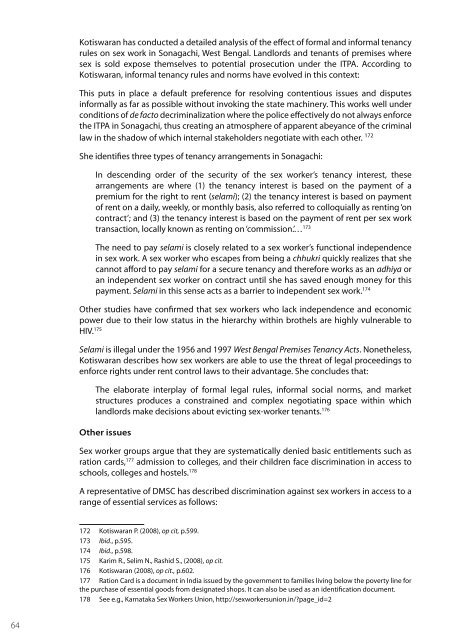SEX WORK AND THE LAW - HIV/AIDS Data Hub
SEX WORK AND THE LAW - HIV/AIDS Data Hub
SEX WORK AND THE LAW - HIV/AIDS Data Hub
You also want an ePaper? Increase the reach of your titles
YUMPU automatically turns print PDFs into web optimized ePapers that Google loves.
Kotiswaran has conducted a detailed analysis of the effect of formal and informal tenancy<br />
rules on sex work in Sonagachi, West Bengal. Landlords and tenants of premises where<br />
sex is sold expose themselves to potential prosecution under the ITPA. According to<br />
Kotiswaran, informal tenancy rules and norms have evolved in this context:<br />
This puts in place a default preference for resolving contentious issues and disputes<br />
informally as far as possible without invoking the state machinery. This works well under<br />
conditions of de facto decriminalization where the police effectively do not always enforce<br />
the ITPA in Sonagachi, thus creating an atmosphere of apparent abeyance of the criminal<br />
law in the shadow of which internal stakeholders negotiate with each other. 172<br />
She identifies three types of tenancy arrangements in Sonagachi:<br />
In descending order of the security of the sex worker’s tenancy interest, these<br />
arrangements are where (1) the tenancy interest is based on the payment of a<br />
premium for the right to rent (selami); (2) the tenancy interest is based on payment<br />
of rent on a daily, weekly, or monthly basis, also referred to colloquially as renting ‘on<br />
contract’; and (3) the tenancy interest is based on the payment of rent per sex work<br />
transaction, locally known as renting on ‘commission.’… 173<br />
The need to pay selami is closely related to a sex worker’s functional independence<br />
in sex work. A sex worker who escapes from being a chhukri quickly realizes that she<br />
cannot afford to pay selami for a secure tenancy and therefore works as an adhiya or<br />
an independent sex worker on contract until she has saved enough money for this<br />
payment. Selami in this sense acts as a barrier to independent sex work. 174<br />
Other studies have confirmed that sex workers who lack independence and economic<br />
power due to their low status in the hierarchy within brothels are highly vulnerable to<br />
<strong>HIV</strong>. 175<br />
Selami is illegal under the 1956 and 1997 West Bengal Premises Tenancy Acts. Nonetheless,<br />
Kotiswaran describes how sex workers are able to use the threat of legal proceedings to<br />
enforce rights under rent control laws to their advantage. She concludes that:<br />
The elaborate interplay of formal legal rules, informal social norms, and market<br />
structures produces a constrained and complex negotiating space within which<br />
landlords make decisions about evicting sex-worker tenants. 176<br />
Other issues<br />
Sex worker groups argue that they are systematically denied basic entitlements such as<br />
ration cards, 177 admission to colleges, and their children face discrimination in access to<br />
schools, colleges and hostels. 178<br />
A representative of DMSC has described discrimination against sex workers in access to a<br />
range of essential services as follows:<br />
172 Kotiswaran P. (2008), op cit, p.599.<br />
173 Ibid., p.595.<br />
174 Ibid., p.598.<br />
175 Karim R., Selim N., Rashid S., (2008), op cit.<br />
176 Kotiswaran (2008), op cit., p.602.<br />
177 Ration Card is a document in India issued by the government to families living below the poverty line for<br />
the purchase of essential goods from designated shops. It can also be used as an identification document.<br />
178 See e.g., Karnataka Sex Workers Union, http://sexworkersunion.in/?page_id=2<br />
64
















